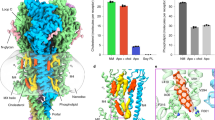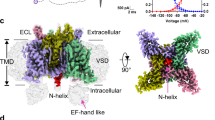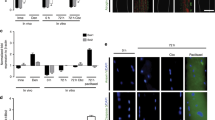Abstract
THE membrane depolarisation of the frog endplate caused by acetylcholine (ACh), either released from the nerve terminals or applied externally, decreases when such applications of ACh are persisted or repeated1,2. This phenomenon, known as ‘densitisation’ or ‘inactivation’ of the receptor to ACh, was first analysed by Katz and Thesleff1 and was suggested to be caused by a change in the receptor molecule from an effective to a refractory state. Subsequent investigations revealed that the rate of this desensitisation depends both on the extracellular concentration of Ca2+ ([Ca2+]0)3–5 and on membrane potential6; being speeded up by increasing [Ca2+]0 or hyperpolarisation of the membrane. These observations and others, demonstrating that the endplate membrane became permeable to Ca2+ during the action of ACh (ref. 7), led to the hypothesis that desensitisation was brought about by transmembrane movement of Ca2+ and the combination of the ions with anionic sites on the inner surface of the endplate membrane4,5. The question then arises of whether desensitisation is caused by molecular changes in the ACh receptor or by those of the subsequent step directly controlling the ionic conductance of the endplate membrane. This subsequent step may involve a macro molecule which has been termed “ion channel” or “ion conductance modulator”8. In an attempt to answer this question, we measured changes in the equilibrium potential of the endplate membrane during desensitisation, using a voltage-clamp technique9,10.
This is a preview of subscription content, access via your institution
Access options
Subscribe to this journal
Receive 51 print issues and online access
$199.00 per year
only $3.90 per issue
Buy this article
- Purchase on Springer Link
- Instant access to full article PDF
Prices may be subject to local taxes which are calculated during checkout
Similar content being viewed by others
References
Katz, B., and Thesleff, S., J. Physiol., Lond., 138, 63–80 (1957).
Thesleff, S., Acta Physiol. scand., 34, 218–231 (1955).
Manthey, A. A., J. gen. Physiol., 49, 963–976 (1966).
Manthey, A. A., J. gen. Physiol., 56, 407–419 (1970).
Nastuk, W. L., and Parsons, R. L., J. gen. Physiol, 56, 218–249 (1970).
Magazanik, L. G., and Vyskocil, F., J. Physiol., Lond., 210, 507–518 (1970).
Takeuchi, N., J. Physiol., Lond., 167, 141–155 (1963).
Kuba, K., Albuquerque, E. X., and Barnard, E. A., Science, 181, 853–856 (1973).
Oomura, Y., and Tomita, T., in Electrical Activity of Single Cells (edit. by Katsuki, Y.), 181–205 (Igaku Shoin, Tokyo, 1960).
Takeuchi, A., and Takeuchi, N., J. Neurophysiol., 22, 395–411 (1959).
Kuba, K., Chikazawa, K., and Koketsu, K., Jap. J. Physiol., 26, 159–175 (1976).
Magazanik, L. G., and Vyskocil, F., J. Physiol., Lond., 249, 285–300 (1975).
Author information
Authors and Affiliations
Rights and permissions
About this article
Cite this article
KUBA, K., KOKETSU, K. Decrease of Na+ conductance during desensitisation of the frog endplate. Nature 262, 504–505 (1976). https://doi.org/10.1038/262504a0
Received:
Accepted:
Issue Date:
DOI: https://doi.org/10.1038/262504a0
This article is cited by
-
Effects of concanavalin A on desensitization kinetics of GABA responses inAchatina fulica neurons
Cell Biology and Toxicology (1995)
-
Desensitization of the nicotinic acetylcholine receptor: Molecular mechanisms and effect of modulators
Cellular and Molecular Neurobiology (1989)
-
Desensitization in denervated mouse muscles
Pflügers Archiv - European Journal of Physiology (1981)
-
Desensitisation does not selectively alter sodium channels
Nature (1977)
Comments
By submitting a comment you agree to abide by our Terms and Community Guidelines. If you find something abusive or that does not comply with our terms or guidelines please flag it as inappropriate.



